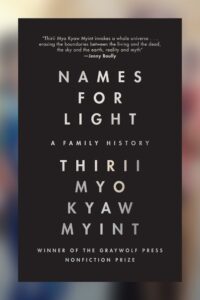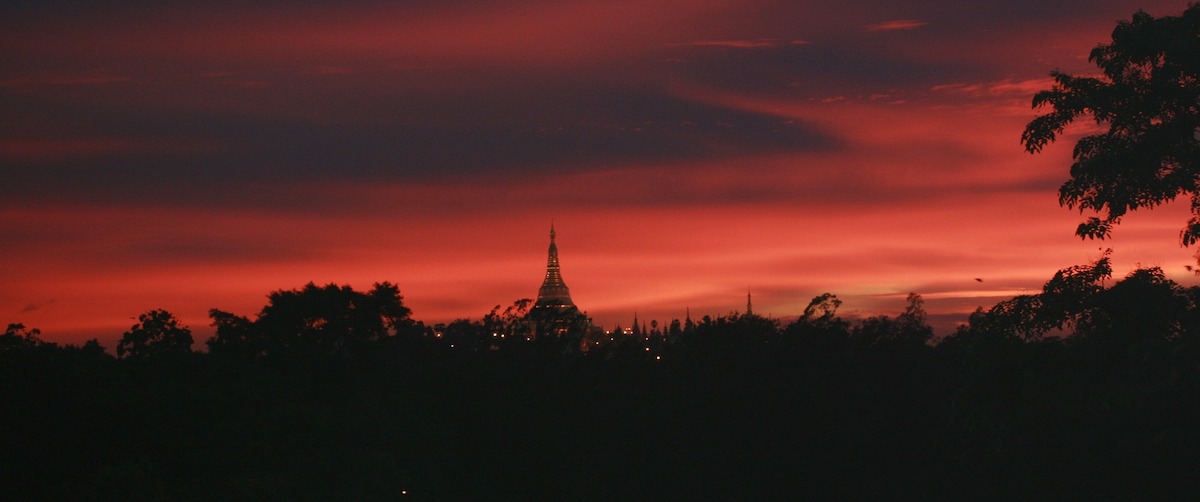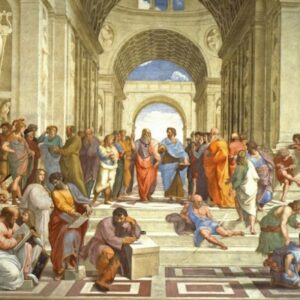My great-grandfather died a man but was reborn as me. He died in a small village in the jungle, the son of a princess hiding from war. The village where they hid was called Leymyethna, four faces, a village built around a pagoda of the same name, bearing a four-faced Buddha. It was my great-grandmother’s village, the place where she was born.
The city where I was born was also once a place to hide. Yangon, the end of yan, of peril, enmity, strife. It was a place where there were no enemies, where enemies could not follow. Except enemies did follow, so that by the time I was born, the city had been conquered thrice, by the British, the Japanese, and the military junta. Three enemies to symbolize the three torments of the mind: greed, aversion, delusion.
*
My great-grandfather’s death was foretold by a trunk that slipped off a bridge and fell into the river upon the family’s arrival in the village. My great-grandfather’s trunk, full of his precious things. The son of a princess, my great-grandfather had inherited diamonds and rubies, sapphires and pearls, jewels my mother had never seen but had heard her mother talk about with remorse, for all the jewels were eventually sold, one by one, to educate my great-grandfather’s sons.
No jewels were sold to educate my grandmother. She was one of seven children, the eldest daughter, my great-grandfather’s favorite child. Her brother, the eldest son, did not call the doctor when my great-grandfather was dying because, my mother said, he resented the love his father had shown only to my grandmother. My grandmother who was born a girl and born second. She was fourteen when her father died, when the cities were bombed, the schools shut down.
*
Many years after my great-grandfather’s trunk fell in the river, my mother dreamed two trunks were thrown into the artificial lake in the center of the city where she had married my father on a floating, mythical bird. My mother was inside of one trunk, my brother in the other, and both trunks were coffins, sinking into the lake, filling up with cold water, and in the dream my mother tried to scream, to break out, she threw her body against the lid of the trunk, kicked and clawed, but it would not open, she could not breathe, until finally, she ceased to struggle, she accepted death, and as she closed her eyes, the trunk opened and her body floated to the surface. Alone in that cold water. When my mother awoke from the dream, she knew that my brother would not live.
*
Except my brother did live, since he returned as my eldest sister, who was born with a birthmark on her foot in the same spot where my grandfather had placed a thumbprint of ash on my brother’s foot before he was cremated.
*
There are no marks on my body from a previous life. Unlike my eldest sister, I was born perfectly blank, perfectly bare. For years, I waited for a mark to appear, a sign of who I was or had been or would become. I searched my body, read and reread it carefully. The sharp point of a tooth, the shape of my hands, the places where I could not bear to be touched: my back, my pelvis, under my chin. I was afraid to change my body in any way, to leave my own mark upon it. I got no tattoos, no piercings. I never dyed my hair, and the one time I had it chemically straightened, I shaved it off afterward. I believed I had to keep my body plain and pristine if I was to receive a sign.
My great-grandfather was reborn in a woman’s body, in my body, my mother said, because he had been a vain, arrogant, and comfort-seeking man.More than once, I believed I had immaculately conceived a child. It is possible for a body to mimic the conditions of pregnancy if the mind believes, possible for the uterus to expand, for the cervix to soften, for the belly to swell. My belly did not swell, but for several months, I felt nauseated and tender, and did not bleed. Every time I found the blood, on the sheets or on my underwear, it was both a relief and a loss.
And my great-grandfather’s trunk was recovered. The trunk that slipped off the bridge and fell into the river. The river was not very wide or very deep, and men from the village dove into the water to retrieve it. The family jewels were saved, to be locked in an attic and eventually sold.
Only my great-grandfather had seen his trunk fall into the water. He had seen it sink beneath the surface, carried away by the current. He could not unsee what he had seen. He knew it was an omen of death.
*
As a child, I conflated my great-grandfather’s body and his trunk of possessions and imagined it was he who slipped off the bridge and fell into the river. I imagined the water turning pink where he hit his head on a rock, the water carrying him away, downstream, then around a bend, so my great-grandmother and grandmother could no longer see him. All rivers lead to waterfalls or to the ocean, so I imagined my great-grandfather was transported somewhere no one could follow him, although my grandmother did try, since she moved south to Yangon, then called Rangoon, a city by the ocean, and my parents and I tried to follow him even farther since we moved across the Pacific. As a child, I imagined that one day my great-grandfather’s body would wash up on a beach in Half Moon Bay the way dead whales, jellyfish, and cows sometimes did.
*
Even when I learned that my great-grandfather had died of a hemorrhagic stroke, a blood vessel that ruptured in his brain, even when I learned that he had died sitting in a chair, not drowning in a river, and that, for my great-grandfather, dying in the jungle, dying in wartime meant dying in the comfortable ancestral home of his wife, the daughter of a village elder, I could not erase the path that the river had carved in my mind. From under the bridge in Leymyethna, south to join the Pathein River, then through the delta into the Pacific Ocean and across it to the shores of northern California. A path created by my great-grandfather’s body, or rather the absence of his body, an absence that I had to fill with my body since I was reborn from him.
*
I do not know if there really is a four-faced Buddha in the pagoda at Leymyethna. The name alone made me imagine it. Myethna means face or surface, but it could also mean cardinal direction. Maybe there are four Buddhas inside the pagoda, seated back-to-back, facing the four directions, or four Buddhas in each corner of the temple, or four windows to let in varying amounts of light, from the east, west, south, and north.
When I learned the cardinal directions in two languages as a child, I thought the English version made more sense: north, east, south, west. It was satisfying to begin at the top and make my way clockwise, in a circle, as if place and time worked in the same way. In Bamar, I had to make a cross, east to west, and south to north. I understood that the sun rose in the east and set in the west, and that was a day, a measure of time, but I did not understand what the south-to-north axis measured. In my textbook, there was a picture of a little girl with her arms held out to her sides facing the sunrise. The girl seemed to suggest that east to west and south to north intersected only at the origin point of a body. South was inscribed on her right arm, north on her left, and west was on her back, which was to me, the reader. Only east floated on the horizon before her, drawing her gaze and mine.
*
My great-grandfather was reborn in a woman’s body, in my body, my mother said, because he had been a vain, arrogant, and comfort-seeking man. He died of a blood vessel that ruptured in his brain. In Bamar, to have a stroke is to have wind cut off. Cut, severed, or crossed over, as when my great-grandfather crossed over to death, or when my family crossed over to Thailand and then the United States, and never returned. Strokes are caused by high blood pressure and high blood pressure is caused, in part, by stress. In moments of stress, people cut themselves off, or are cut off, from a family, a culture, a nation, even from a life.
*
My great-grandfather felt dizzy and asked for the doctor. Then he sat down in his chair and died. He died right away, my grandmother told my mother, he did not suffer much. My great-uncle, the eldest son, never called the doctor, or he delayed, or he called the doctor only after his father had died. This great-uncle was the one who was later sent to Rangoon for an education, the one for whom royal jewels were sold. He was sent away even before he had graduated from secondary school. Despite all my great-grandmother’s efforts, he did not graduate.
*
Many years after the end of the war, and the end of my great-grandfather’s life, I went to the Colorado School of Traditional Chinese Medicine and asked the students there to tell me what was wrong with me. The first time I asked, they said they would consult their supervisor. The second time I asked, at the end of my appointment when I was already checking out at the front desk, the student behind the desk told me my diagnosis: blood deficiency with internal wind. What does that mean? I asked, and the student seemed reluctant to explain. It has to do with your blood circulation, she said, and wind can be related to strokes, paralysis, seizures, anything like that.
I did not tell the student that I was reincarnated from my great-grandfather or that he had died of a hemorrhagic stroke, because even at a traditional Chinese medicine clinic, I suspected that this information would seem irrelevant. I thanked the student and made an appointment to see her again the next week.
*
The war came to an end soon after my great-grandfather’s death. Bombs stopped falling on cities and the family was able to come out of hiding and return home. Home was a house in the city of Hinthada, a port city by the Irrawaddy River, where my great-grandfather and great-grandmother had settled after their marriage. I do not know why my great-grandmother did not stay in the village of Leymyethna, her ancestral home. I do not know why she chose to leave her parents’ house, for the first time as a bride, and the second time as a widow. I do not know why but I know that she did: she returned to Hinthada with her seven children and a trunk full of jewels. She would not leave the city again. Forty years after my great-grandfather’s death, my great-grandmother would die in the city, in Hinthada, in the house that had withstood the British bombs and Japanese bombs.
*
And it was a miracle their house had withstood the bombs and the looters. Many of their neighbors’ homes had been destroyed. Some of their neighbors never returned. Every night, my great-grandmother walked through the house casting prayers of protection so the family would not be robbed, so the jewels her late husband had inherited would be safe in the attic where she hid them.
When my great-grandfather was still alive, he kept the family jewels locked in a chest, a chest he would habitually open with a key, so he could gaze upon his mother’s treasure. Even then, long before the jewels were sold, one by one, they were already relics of a lost time, of a slaughtered and exiled monarchy. My great-grandfather’s mother was a princess, a niece of the last true king. The very last king of Burma was not a true king, my mother always said. He came into power only because his mother-in-law had all of his brothers and sisters put to death, all the princes and princesses with a claim to the throne. It was bad luck to spill royal blood upon the earth, so the princesses were strangled, and the princes were thrown into sacks and beaten to death. In other stories, they were rolled into carpets and trampled by elephants. My great-grandfather’s mother only escaped because she was not a daughter of the king. She was a daughter of the king’s elder brother. She escaped from the palace with her life and the jewels she was wearing on her body.
*
I find a detailed fact sheet on my diagnosis of blood deficiency: Some Causes, Potential Signs, What to Do.
Causes: eating poorly, thinking too much
Signs: dry skin, hair loss, numbness, dizziness, poor memory, difficulty focusing, depression, anxiety, stress, difficulty falling asleep, a feeling of disembodiment, lack of strength, headaches and migraines
To Do: everything I have already tried.
I wondered if my great-grandfather exhibited the same potential signs before he died. If he too had tried meditation, yoga, chi kung, cooking, reading, and walking. I wondered if he too had had seizures. The tingling in his hands and feet, the hazy feeling, like a curtain drawn over the whole world, and then the tightening, the loss of control, his body wrung out and warped. Did he feel the shame of being conscious through it all? Through the interminable seconds that it lasted? Did he try to hide the seizures the way I did, for years and from everyone around him? Did he live in fear of his own body, of not knowing when or how it would betray him, of not knowing why?
*
When I was younger, my mother and father feared I would grow up to be too much like my great-grandfather. I was their youngest and most American child, and they feared that the vices of the aristocracy would resurface in my relatively privileged person: laziness, indulgence, arrogance. Don’t be such a smart-ass, my father said to me one morning when we were stopped in traffic. I cannot remember what I had been saying. It was the only time my father ever swore at me.
My mother said my pride was too quick to swell, and I had to learn to suppress it. She wanted me to be gentle and sweet. Hearing those words, I wanted nothing more than to break them with my hands. I wanted nothing more than to kill. I believed, at times, that I was capable of murder. Not the murder of a living being, for that was against the first precept, but the murder of a living idea, a concept: gentleness, sweetness, femininity. I did not understand why my parents were so intent on reforming me when I had already been born into a woman’s body. I did not know what I had left to lose in the next life.
__________________________________

Excerpted from Names For Light by Thirii Myo Kyaw Myint with the permission of Graywolf Press. Copyright 2021 by Thirii Myo Kyaw Myint.



